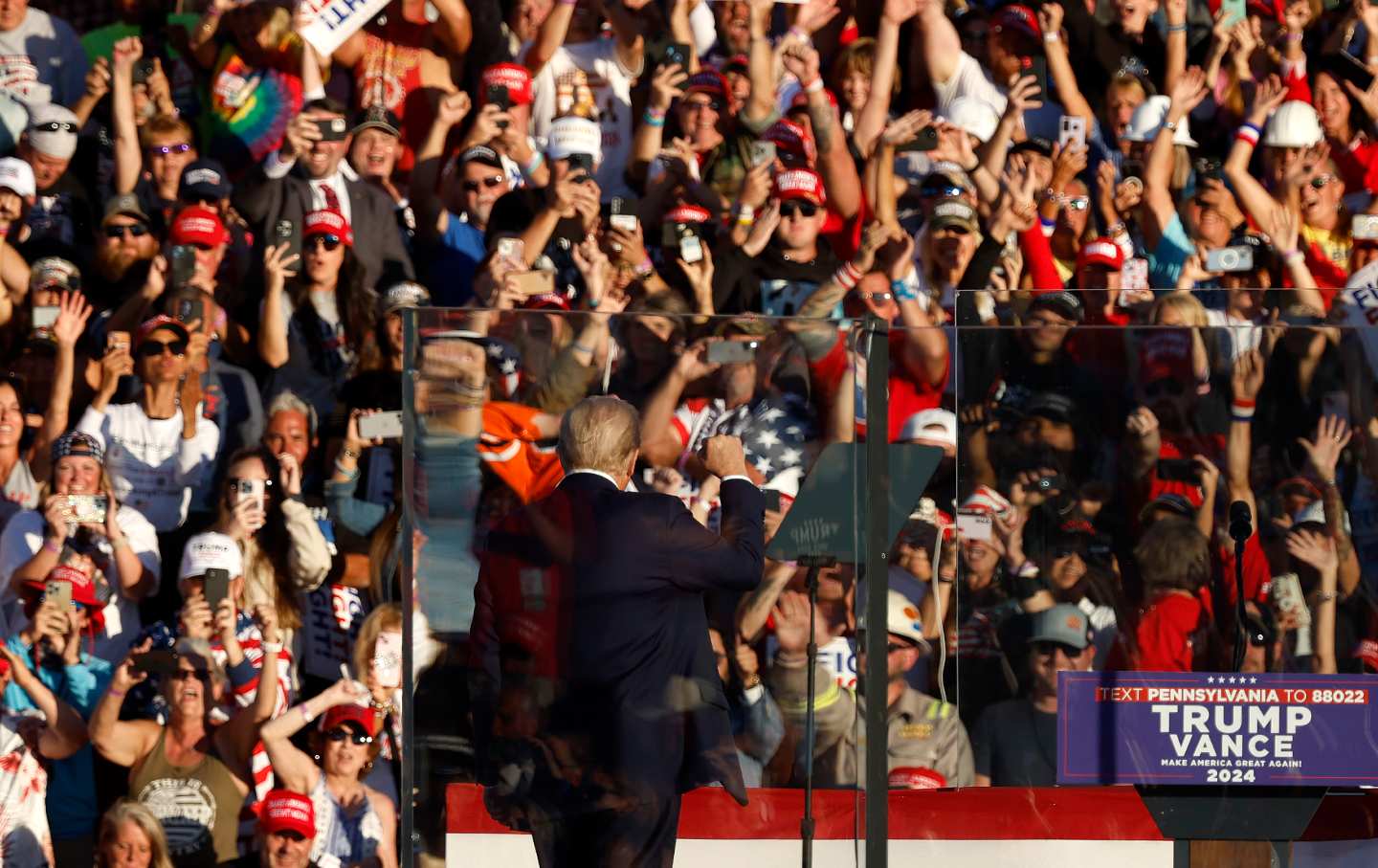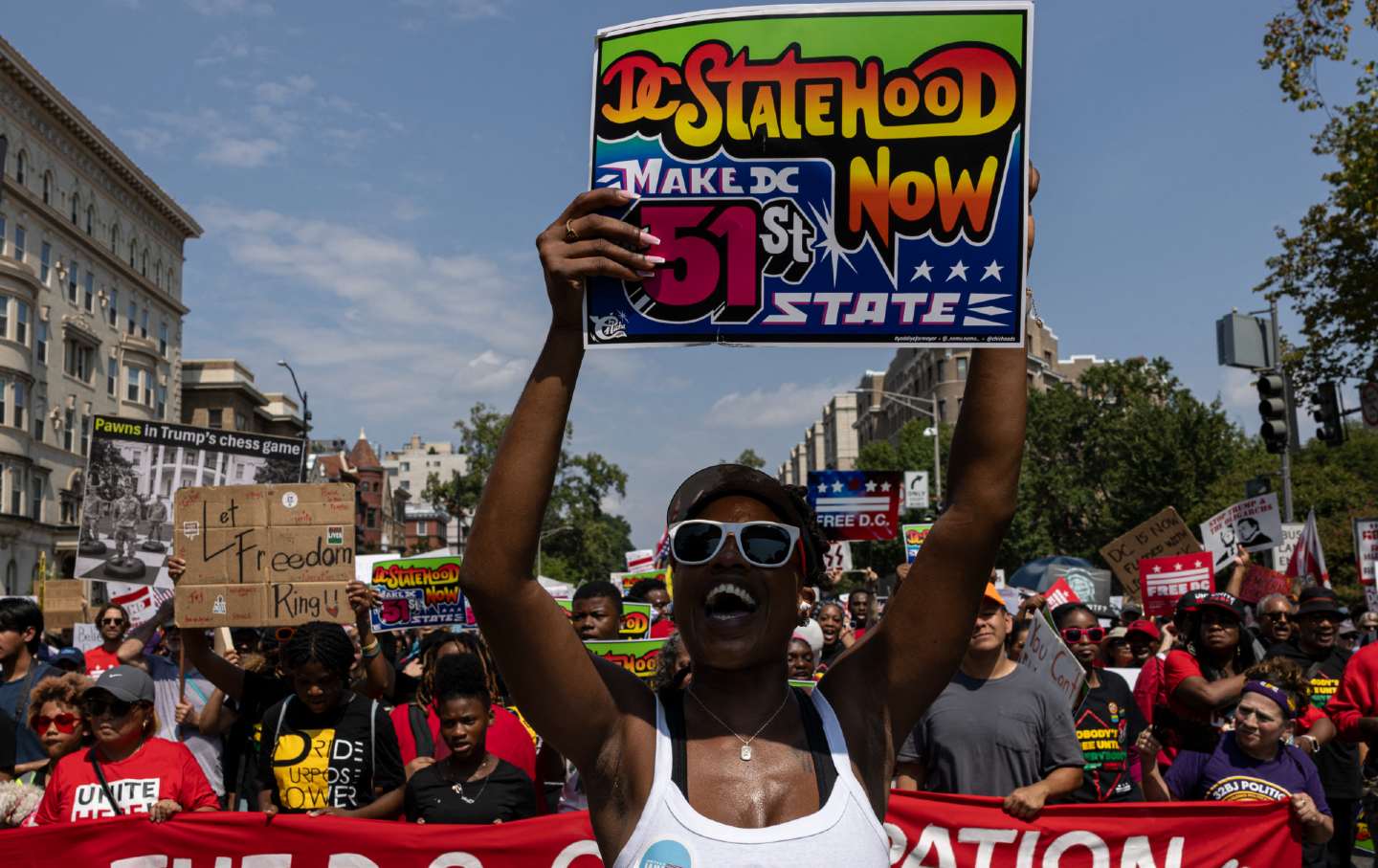Mainstream media is ignoring the fact that the late sex trafficker was a power broker who shaped global policy.
Demonstrators hold protest signs during a march from the Atlanta Civic Center to the Georgia State Capitol on October 18, 2025, in Atlanta, Georgia.
(Julia Beverly / Getty Images)
The prospect of chaos and war excited Jeffrey Epstein. The late New York financier and child abuser kept a keen eye on news about foreign conflicts that could be exploited for commercial gain. On February 21, 2014, Epstein sent an e-mail to Ehud Barak, the former Israeli prime minister, with whom he would partner the following year as investors in a security tech firm Reporty Homeland Security (later renamed Carbyne). Epstein wrote, “with civil unrest exploding in ukraine syria, somolia [sic], libya, and the desperation of those in power, isn’t this perfect for you.” Barak tried to tamp down his friend’s enthusiasm, noting, “You’re right [in] a way. But not simple to transform it into a cash flow.”
This exchange, which was reported by Drop Site News, gets at the heart of one of the more hidden aspects of the Epstein scandal. Epstein’s name is inextricably linked with sexual predation, as it should be. But it should just as readily be linked to global militarism and authoritarianism. Epstein trafficked not just in the bodies of the children he abused but also in social connections that could bring elites together. He well understood that the “desperation of those in power” could make them eager to buy what he was selling: connections with other powerful figures and security systems to clamp down on dissent.
The Epstein scandal has once again exploded thanks to the release this week by House Democrats of an immense cache of e-mails between Epstein and many of his famous associates. As my Nation colleagues Chris Lehmann and Joan Walsh have written, these e-mails are politically damaging to Donald Trump, adding yet more evidence that the president was close friends with Epstein for many years, aware of Epstein’s predations, and possibly a participant in some of Epstein’s crimes.
Trump richly deserves whatever reputational harm and possible legal retribution may come to him as a result of his ties to Epstein. But, at its heart, this has always been a scandal about the ruling class as a whole, not one individual or political party.
The Epstein e-mails document his ties to a wide swath of the US and global elite in ways that transcend partisan lines. Among those Epstein was on easy terms with were former treasury secretary Larry Summers (who held high office under both Bill Clinton and Barack Obama) as well as Trump adviser Steve Bannon and right-wing billionaire Peter Thiel. Even Noam Chomsky wrote glowingly of his “highly valued friend.”
The open question about Epstein was why he was allowed to flourish for so long when his crimes were for all intents and purposes an open secret for decades. For instance, why did he receive a sweetheart deal in 2008 that amounted to a slap on the wrist for sex crimes with underage girls? The man who negotiated that deal, former US prosecutor Alex Acosta, had previously been quoted as privately telling Steve Bannon that Epstein “belonged to intelligence.” But in congressional testimony released last month by the House Oversight Committee, Acosta said he had “no knowledge as to whether [Epstein] was or was not a member of the intelligence community.”
The ambiguity of the reporting around Acosta’s comments, coupled with the many mysteries surrounding Epstein’s wealth and social connections, has long fueled speculation that he had been an asset of the CIA or Mossad.
Thanks to diligent reporting from two independent outlets, Drop Site and Reason, we now have a much better sense of Epstein’s relationship with the foreign policy elite of the US and Israel. It seems that Epstein was not a CIA or Mossad asset—not because he didn’t have it in him, but because that was too lowly a role. Rather, he was a power broker, an American oligarch, who played a major role in shaping Western policy, which brought him in contact with spy agencies and diplomats.
Writing in the libertarian magazine Reason in August, Matthew Petti documented the nature of Epstein’s ties with Ehud Barak:
After his first arrest for sex crimes, Jeffrey Epstein tried to get into a new line of work: surveillance. In 2015, he partnered with former Israeli Prime Minister Ehud Barak to invest in a security tech startup called Reporty Homeland Security, now known as Carbyne. Leaked emails show that Epstein was using Barak to seek out opportunities in the surveillance industry and build connections with powerful figures around the globe, including American businessman Peter Thiel, the former director of Israeli signals intelligence, and two people in Russian President Vladimir Putin’s circle.
After Epstein was arrested for a second time in 2019, Barak cut ties with his business partner. Speaking to Haaretz, Barak explained that Epstein was “a terrible version of Dr. Jekyll and Mr. Hyde” (strangely implying there is a happy, upbeat version of Robert Louis Stevenson’s horror story). Barak added that Epstein “at the time seemed to be an intelligent person, socially well connected and of wide areas of interest, from science to geopolitics.”
Petti’s research was based on a source that has largely been neglected by the mainstream media: a cache of hacked Barak e-mails found on the Distributed Denials of Secrets website (which functions as a clearing house for leaks in the manner of Wikileaks).
Murtaza Hussain and Ryan Grim of Drop Site have recently used the same site for a series of blockbuster reports that deepened the story of Epstein’s ties to Barak, and the foreign policy elite of the USA and Israel. One story reported that
Jeffrey Epstein facilitated efforts to open a backchannel between Israel and the Kremlin during the Syrian civil war.… The trove of emails, exchanged at the height of the Syrian civil war between 2013 and 2016, reveal Epstein’s successful efforts to secure a private meeting between Barak and Russian President Vladimir Putin to discuss a Russian-brokered end to the conflict, including winning Russian support for a negotiated removal of Syrian President Bashar al-Assad.
Other stories documented Epstein’s role in deepening ties between Israel and Mongolia and Cote d’Ivoire (in both cases, facilitating the sale of Israeli surveillance technology). The Drop Site team has also reported that an Israeli intelligence officer (the late Yoni Koren, a long-time associate of Barak) was a frequent guest at Epstein’s Manhattan residence.
Epstein’s ties to American intelligence remain murky, but it strains credulity that an American citizen could be engaged in such high-level diplomatic work (involving contact with foreign powers) without the awareness and tacit support of the US national security state.
Epstein’s outsize role in foreign policy makes clear he wasn’t a servant of empire but one of those who shape it. An astute analysis of Epstein’s unique position was provided by international relations scholar Van Jackson, who teaches at Victoria University of Wellington. Writing on his Un-Diplomatic Substack, Jackson noted that Epstein was
one of the world’s preeminent geopoliticians, which is why he entangled so many powerful people in his misdeeds. The human-trafficking sexcapades were not the main thing bringing him together with his pedo friends. It was money and power politics, forming a vital artery of US global hegemony.
Epstein—as a broker between Israeli intelligence and foreign oligarchs and kleptocrats—was also a creature whose existence owed to the structure of American hegemony, aka the neoliberal economic order, aka the era of neoliberal globalization.
The Jeffrey Epstein story makes no sense unless you realize that he was deeply entrenched in the foreign policy elite, a fact that gave him much of the impunity he enjoyed for most of his life. Powerful people felt comfortable around Epstein because he was one of them. He had the same neoliberal worldview that has dominated the US elite since the end of the Cold War. He was a believer in the Washington Consensus, US military hegemony bolstered in the Middle East by the alliance with Israel, globalization, the privatization of government functions, STEM-dominated education, and male-centered sexual hedonism—an ethos he took to sickening extremes.
Popular
“swipe left below to view more authors”Swipe →
In a 2015 e-mail to Barak, Epstein reflected that “many corporations are looking for a new military like perspective on mgmt.” This fusion of the corporate culture with militarism is one of the hallmarks of the neoliberal era. Epstein was at the forefront of this development.
In trying to make sense of Epstein’s career, it’s hard not to be reminded of one of the greatest of American novels, Thomas Pynchon’s Gravity’s Rainbow (1973). Pynchon was obsessed with the covert system formed in wartime that merged deceptive public goals with private ambitions and corporate agendas. At one point, the narrator of Gravity’s Rainbow reflects on how war allows traffickers of all sorts—in luxury goods, in sex work, in refugees—to thrive: “Don’t forget the real business of the War is buying and selling. The murdering and the violence are self-policing, and can be entrusted to non-professionals…. The true war is a celebration of markets. Organic markets, carefully styled ‘black’ by the professionals, spring up everywhere.” Epstein flourished in the shadows of those organic markets.
The mainstream media has been strikingly incurious about the nature of Epstein’s geopolitical activity. The blockbuster reporting in Reason and Drop Site has not been matched by any comparable investigations in The New York Times or The Washington Post, on CNN or the major networks. The mainstream media has in fact long participated in covering up the full scale of the Epstein story. The original cover-up was ignoring his sexual crimes. Those are now better reported. But by ignoring how integrated Epstein was with the American empire, these outlets are conducting another cover-up.
More from The Nation

Anti-Blackness and race hate increasingly seem to be a rite of passage for white folks, no matter where they end up on the political spectrum.

As strand by strand of the safety net is plucked away until it’s shredded, aging in America is a fearful and destructive business. And Donald Trump doesn’t care.

After fumbling the cause of DC statehood, Democrats now appear helpless as Trump sends troops into the city.

One of Israel’s biggest companies is taking over huge swaths of US real estate—and tenants are paying the price.

All too often, when parents can’t afford safe housing, the solution child welfare services offer is putting their children in foster care.










